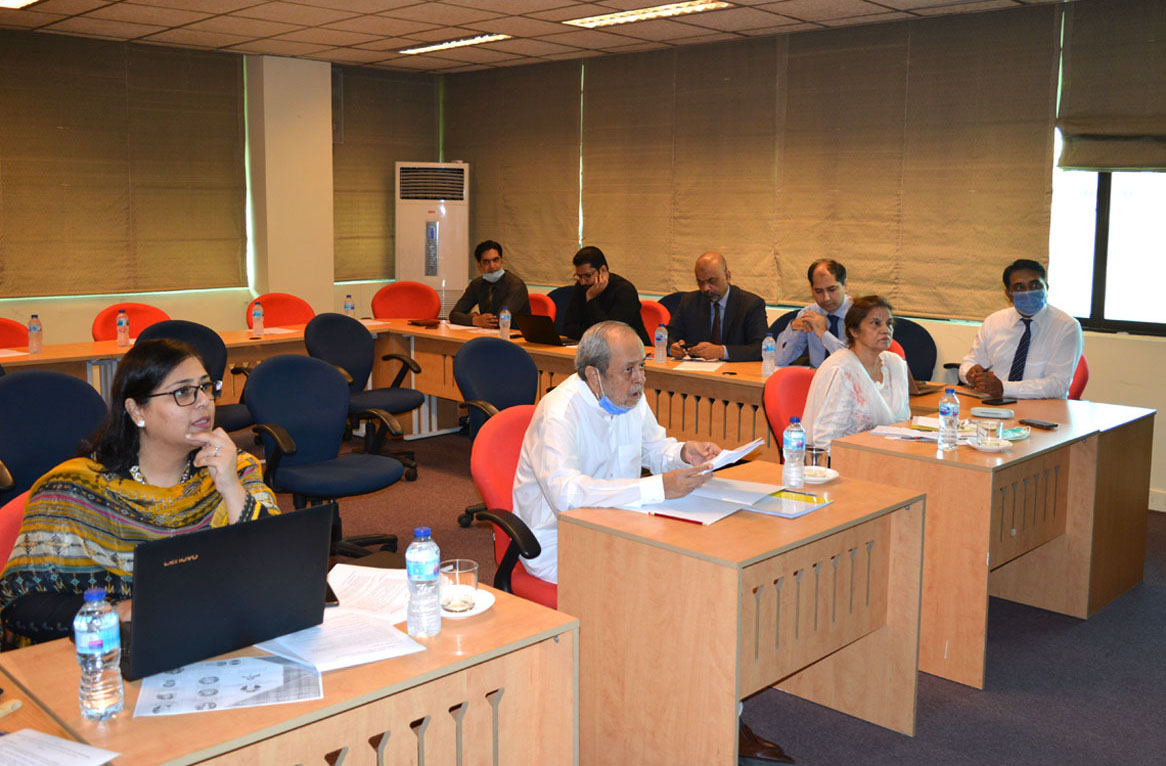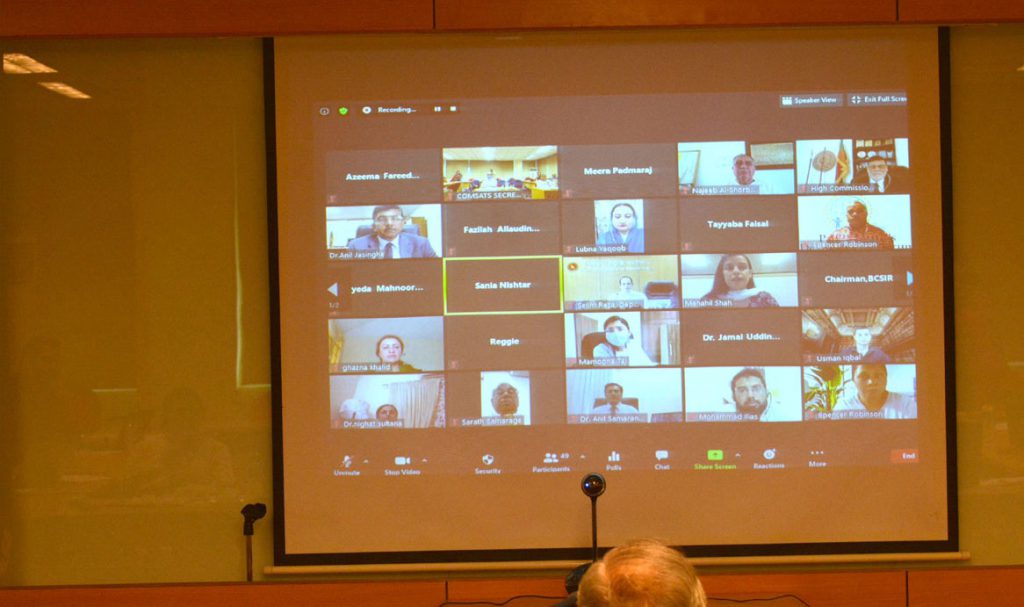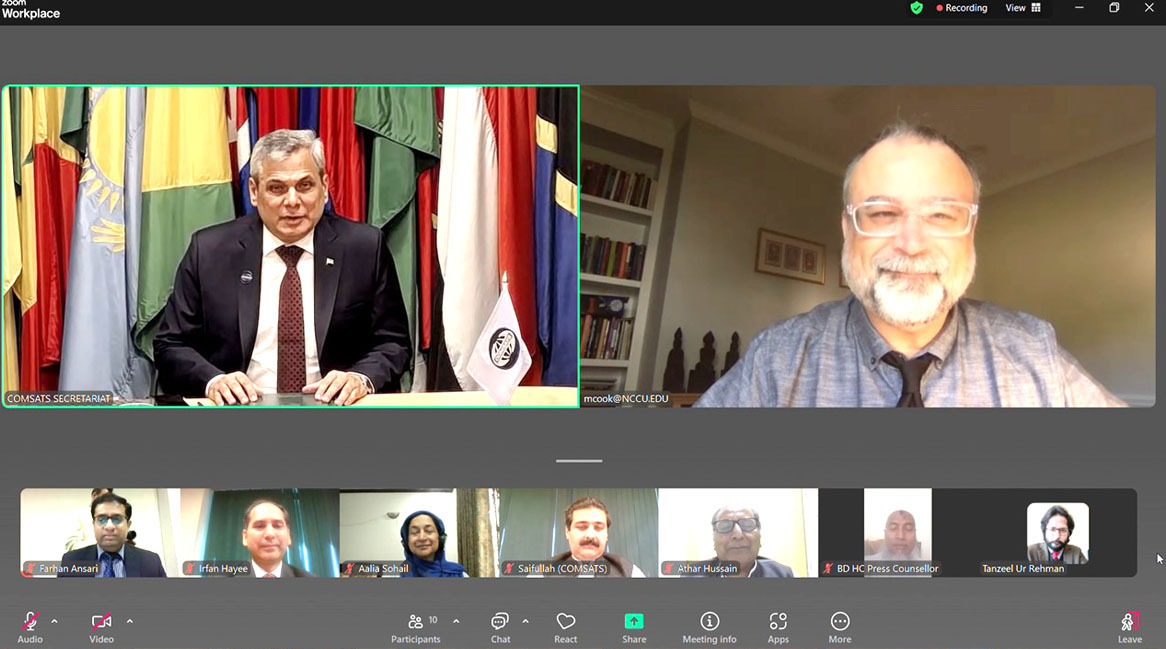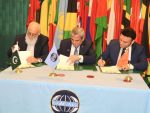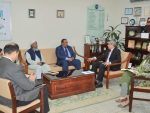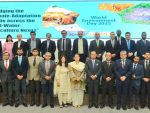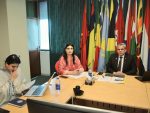COMSATS, in collaboration with the Commonwealth Centre for Di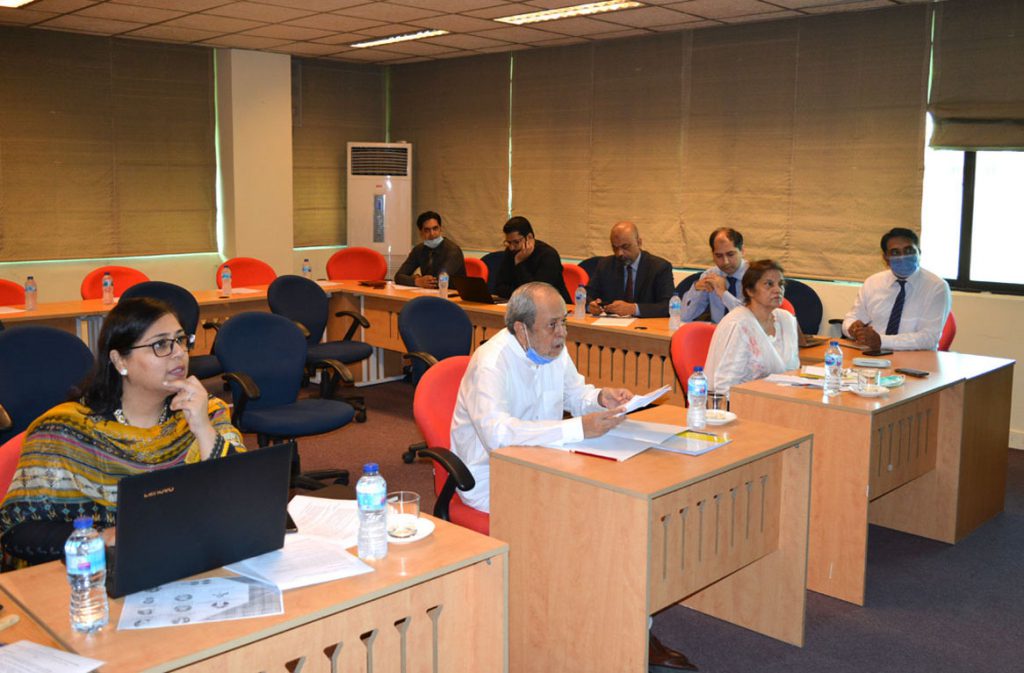 gital Health (CWCDH), organized an international webinar on ‘Digital Health in COVID-19: Sharing Experiences of COMSATS’ South Asian Member States’, on 7th September 2020. The event was aimed at gathering relevant stakeholders from South Asian Member States of COMSATS for sharing experiences in response to the COVID-19 pandemic, in particular, COVID-19 related digital health developments at governmental and institutional level. The webinar was attended by a significant number of relevant individuals from Pakistan and abroad.
gital Health (CWCDH), organized an international webinar on ‘Digital Health in COVID-19: Sharing Experiences of COMSATS’ South Asian Member States’, on 7th September 2020. The event was aimed at gathering relevant stakeholders from South Asian Member States of COMSATS for sharing experiences in response to the COVID-19 pandemic, in particular, COVID-19 related digital health developments at governmental and institutional level. The webinar was attended by a significant number of relevant individuals from Pakistan and abroad.
In his welcome remarks, Dr. S. M. Junaid Zaidi, Executive Director COMSATS, thanked the Commonwealth Centre for Digital Health (CWCDH) for jointly organizing the webinar. He highlighted COMSATS’ service to digital health in the form of COMSATS Telehealth Programme started at the turn of the millennium.
In her keynote address, Dr. Sania Nishtar, SAPM on Poverty Alleviation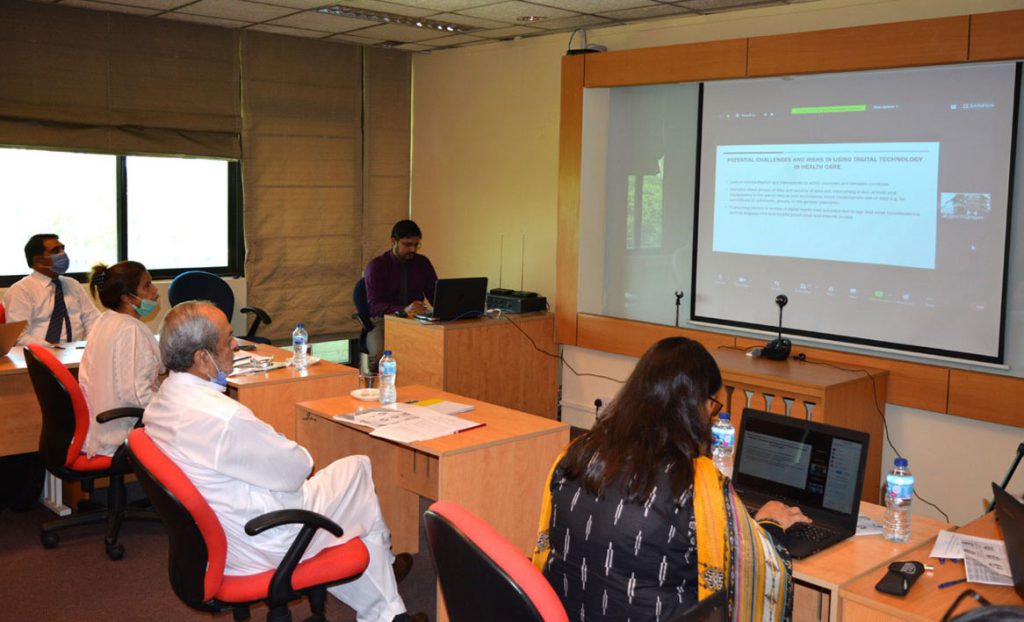 and Social Protection and Federal Minister, Government of Pakistan, thanked COMSATS for organizing the present webinar and appreciated COMSATS’ role as a leader in the use of digital technologies. Dr. Nishtar noted that COVID-19 has helped established digital technologies as a strong pillar of healthcare system.
and Social Protection and Federal Minister, Government of Pakistan, thanked COMSATS for organizing the present webinar and appreciated COMSATS’ role as a leader in the use of digital technologies. Dr. Nishtar noted that COVID-19 has helped established digital technologies as a strong pillar of healthcare system.
While sharing Pakistan’s experience in COVID-19 response, Dr. Nishtar especially highlighted the role of Government’s ‘Ehsaas’ Programme that helped manage the situation from pandemic response as well as poverty alleviation angles. She informed that the Programme aided Pakistan’s response to the emergency needs of one third of the country’s population that was affected by the necessary lockdown. She informed that Pakistan’s experience of dealing with the pandemic is also being shared with missions in Geneva and New York. Dr. Nishtar showed willingness to engage in more international fora on digital health technologies through COMSATS.
Speaking on the occasion, Dr. Vajira Dissanayake, Chairperson, Commonwealth Centre for Digital Health, considered the role of innovation and advocacy of crucial importance in dealing with the pandemic. Dr. Dissanayake expressed willingness to work with all partners in finding regional solutions to the pandemic.
Dr. Selim Reza, Deputy Secretary at the Ministry of Science and Technology, Bangladesh, shared some key interventions taken and challenges faced by Bangladesh during the pandemic. He hoped that this platform will help share important knowledge for the benefit of other developing countries. In his remarks on the occasion, Prof. Dr. Md. Aftab Ali Shaikh, Chairman of Bangladesh Council of Scientific and Industrial Research (BCSIR), Bangladesh, paid homage to his government for the role it played during the pandemic and highlighted the importance of S&T backed solutions and responses to COVID.
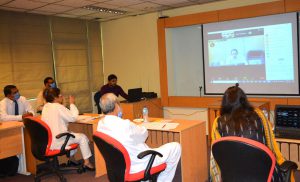
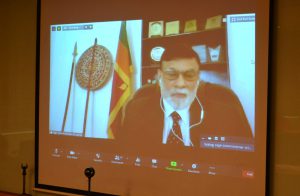
Dr Anil Jasinghe, Secretary, Ministry of Environment and Former Director General, Health Services, Sri Lanka, informed that the country was successful in controlling the drastic impact of the pandemic in a rapid manner which he attributed to good strategy and stringent measures taken by country’s government. H.E. Vice Admiral (Rtd.) Mohan Wijewickrama, High Commissioner of Sri Lanka to Pakistan, informed of some measures taken by the country including establishment of Corona task force mandated to deal with the exigency. He remarked that post COVID-19 world would be different in a number of ways and the overall social landscape has already changed considerably. Recalling the variety and levels of responses to COVID-19 throughout the globe, he appreciated Pakistan’s strategy and success in dealing with the pandemic in the last few months.
In her vote of thanks, Ambassador (Rtd) Fauzia Nasreen, Advisor (SDGs) at COMSATS Secretariat, expressed her gratitude towards the distinguished guests, participants and panelists. She remarked that as a priority area set by the World Health Organization (WHO), the pandemic response needs consolidated efforts for coping and recovery in order to build resilience and regain pace towards development goals.
The technical proceedings of the event were chaired by Dr. Ghazna Khalid, Me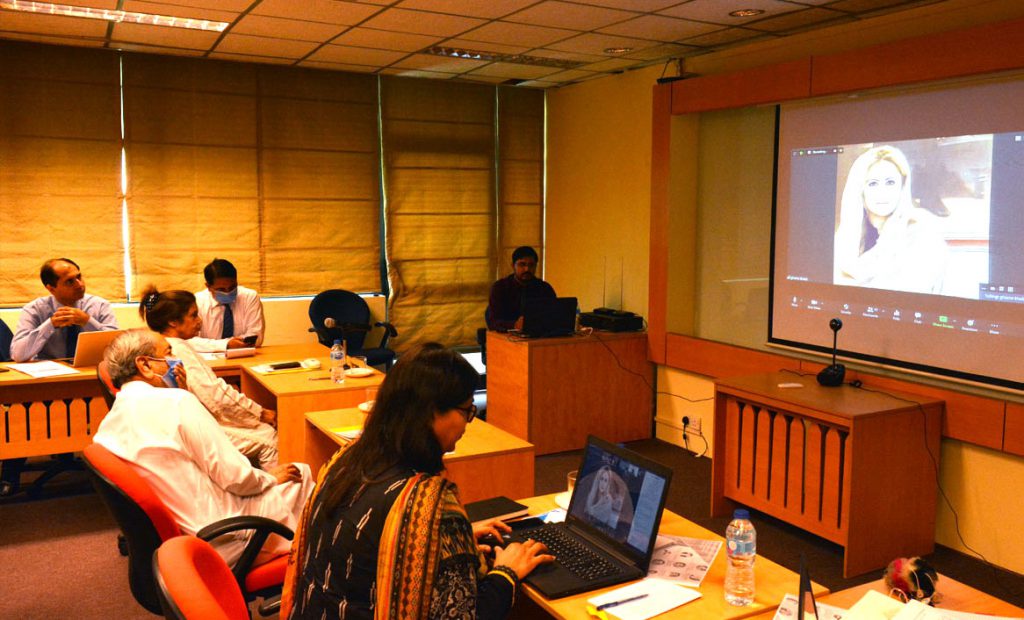 mber of Prime Minister’s Task Force on COVID-19, Government of Pakistan. In her remarks, she considered the present event a great opportunity to exchange experiences and technological response. She deemed CDWH a lynchpin, in establishing and strengthening such collaborations, while also encouraging 27 member states of COMSATS to create a pandemic solidarity drive. She further remarked that this adversity has highlighted hidden opportunities and has resulted in a paradigm shift in Pakistani government’s approach towards healthcare. It has helped identify gaps and alternatives and created new success stories.
mber of Prime Minister’s Task Force on COVID-19, Government of Pakistan. In her remarks, she considered the present event a great opportunity to exchange experiences and technological response. She deemed CDWH a lynchpin, in establishing and strengthening such collaborations, while also encouraging 27 member states of COMSATS to create a pandemic solidarity drive. She further remarked that this adversity has highlighted hidden opportunities and has resulted in a paradigm shift in Pakistani government’s approach towards healthcare. It has helped identify gaps and alternatives and created new success stories.
Further during the session, digital health experts and practitioners from Bangladesh, Sri Lanka, and Pakistan, delineated on measures, policies and best practices that were utilized to cope with the pandemic in their countries.
Dr. Nowshin Jabin from Chattogram Medical College Hospital, Bangladesh, informed that while the potential of digital technologies has been more recognized during the pandemic, it is not a new concept in Bangladesh, and recalled a number of related interventions in the country since 1998. She shed light on a recent initiative, We the Dreamers, that is working towards utilization of digital technologies to aide pandemic response in the country, that facilitates medical consultation with doctors, treatment and follow-ups through digital means and pre-set protocols.
Dr. Anil Samaranayake, Director (Health Information), Ministry of Health, Sri Lanka, noted that Sri Lanka is the only country other than US with trained health informatics human resource that gives the country a huge advantage in pandemic response through digital technologies. He shared the measures in place in the country in response to the pandemic that included, prevention and education, triage and testing facilities, and medicine delivery systems. It was remarked that Sri Lanka already has digital health policy which is being revisited and can be shared with other member states of COMSATS for their benefit.
Ms. Lubna Yaqoob, Senior Specialist Digital Health and Information System HPSIU, Ministry of National Health Services NHSR&C, highlighted Pakistan’s experience in devising a strategy for implementing digital health in the country in the absence of any existing policy guidelines. She highlighted COMSATS as a key supporter of digital health initiatives in the country and hoped that COMSATS could demonstrate its telehealth model to policy makers to help pilot more of such projects for better utilization of digital technologies in national healthcare systems.
Subsequent discussions touched upon issues relating to cooperation in policy and strategy sharing at governments and institution levels; data collection and analytics; joint publications based on indigenous researches and success stories; training of doctors and young practitioners for better pandemic response; application of digital technologies for pandemic as well as for non-emergency response, building better infrastructure in remote areas that are affected the most in both situations.
The event ended on an understanding that the discussions during the meeting should lead to follow-up collaborations, exchanges and dissemination of knowledge leading to promotion of digital health as well as to better pandemic response in the region.

